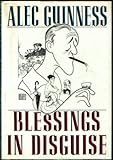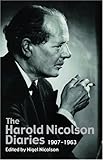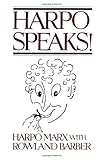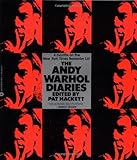You’ve picked five diaries and autobiographies, from five characters who all feature in your own book One on One. Why are you so fond of other people’s diaries?
I like them because although people can fake diaries I tend to feel that they don’t. And I like the perspective of a diary, in that people don’t know what’s going to happen next. Wartime diaries are especially interesting in that minute-to-minute sense.
Whereas when you’re writing with hindsight, everything is filtered somehow?
Yes, it’s filtered and somehow boring. Hardly any autobiographies are good. Especially with politicians, there are no good autobiographies. Political diaries are a more sensible route.
Writing about yourself in whatever form, there must be much which is masked and fake.
The other day, I was on [the BBC radio programme] Desert Island Discs. Thinking back about it, almost everything I said was bogus. I wasn’t trying to be, but if you say one thing about yourself then you cut off all other aspects. It’s very difficult to be truthful, other than on a day-to-day basis. So the best diaries face outwards. They’re not particularly concerned with themselves. Sylvia Plath, who was very concerned with herself, wrote incredibly boring diaries because they were trying to dramatise her life. They were introspective and solipsistic, which becomes tedious very quickly.
What are the qualities of an un-tedious diarist?
It is often social climbers who write diaries, so you have to be aspirational. That applies to diarists like [British Conservative MP] Alan Clark and [English playwright] Noël Coward. They want to be in with the smart crowd. But they are also beady eyed, so they can see everything wrong with the kind of people that they want to be in with. That gives a tension.
So they, like you, have a satirist’s eye?
Yes. I think there has to be a sense of humour, and a sense of the ridiculous, otherwise it’s solemn. Also, in some ways, a sense of yourself as a character within the book. Alan Clark develops his comic character which is based on himself but isn’t entirely himself. Another thing you need is shamelessness. You’re not particularly worried what people will think of you when they read your diary. The worst diarists are the ones looking over their shoulder at what the reader will think of them.
Is there not something inherently pompous about diary writing? It’s an odd genre, meant to be personal but often written with a reader in mind.
You could say that any form of writing is pompous, because you think someone else should read it. But the best diaries are humble, because they are looking at other people rather than themselves. You are seeing the world through their eyes.
[caption id="" align="alignnone" width="113" caption="Blessings in Disguise by Alec Guinness"] [/caption]
[/caption]
Your first book choice is Alec Guinness’s autobiography. Alec Guinness wrote three lots of diaries, and then there is the autobiography, which is diary in disguise. I don’t draw much of a distinction between them. Often in the diaries he will remember something from 20 years ago – it’s not quite faking, but it’s a way of including all your life. I rather like Alec Guinness as a diarist. He is sheltered and quiet, quite slippery in a way. You can’t quite put a finger on him.
How do you mean?
Yes I was wondering what I meant as I was saying it. Because he’s so quiet and observant, you’re never quite sure where he stands in relation to other people. Sometimes you’re also not quite sure if he’s telling the truth. That’s one of the problems of diaries. Just because it’s written down by the person, it doesn’t necessarily mean it happened in that way. But he is very cultured and intelligent, and this makes very good reading.
Guinness was also very keen on spiritualism, and thought he had psychic flashes that foretold the future. He claimed to have predicted James Dean’s death in a car crash, to Dean himself, within a week of it occurring. One wonders if that is not all invented. If he did invent it, I suspect he believed his own invention.
You include a description of Guinness’s prediction, upon seeing James Dean’s new car, in One on One.
It sounds implausible, I know. He said it on a number of chat shows, in his diaries and in the autobiography. Of course that doesn’t make it true, but the only other person able to vouch for it would be James Dean, who’s not in a position to do so. But sometimes it seems such an extraordinary story that I think it probably is true.
It might have just been an accurate psychological observation. You see a young man who already has a reputation for being wild. He might appear hyper or drugged up. On meeting, he shows you this car he has never driven before – still in its wrapping, as far as I can remember – which he says is the fastest in the world. Maybe it doesn’t take a genius to say: Don’t get into that car. So if you were a psychologist you could explain in that way what Guinness saw as a psychic flash.
Does he otherwise come across as a pleasant and sane chap?
I never really met him, but I was once in a lift with him and he seemed perfectly nice. He was famously quiet and unobserved. People didn’t recognise him in the street, because he would just go quietly along. He comes across as a very attractive character, somebody you would get along with.
[caption id="" align="alignnone" width="103" caption="The Harold Nicolson Diaries by Harold Nicolson"] [/caption]
[/caption]
How about Harold Nicolson?
Certainly towards the end of his life, Harold Nicolson was a crabby old thing. But he wrote his diaries at a particularly interesting time, just before and during the [Second World] War. He starts off as a journalist, but you soon realise how small society was then. In one of his first diary entries he is walking up Whitehall and bumps into the Chancellor of the Exchequer, who invites him into parliament for a drink.
He’s very good at describing parliament during the war, and the fear at the time – because they didn’t know who was going to win. He writes about Churchill, whom many people thought was doing things wrong, and the furious debates unconnected with the war, such as about education. He didn’t have to believe that the government was doing the right thing either. It was a proper democracy.
So he met and wrote about all the major political players of the time?
Yes, and also artists. He met Dali, James Joyce, had lunch with TS Eliot and so on. He is a jolly good describer of how people spoke, looked and what it was like to be in the room with them. In some ways he was the perfect diarist. He may come across as a social climber, which is because he was, otherwise he couldn’t have written this all.
What do we learn about his personal life, including his marriage to Vita Sackville-West?
This is interesting, because from other people’s accounts he was picking up women just about every day. And of course Vita was having affairs too. But not a hint of it comes into the diaries. He portrays himself rather as he looks, which is a moustachioed, pipe-smoking old buffer. He’s not lying, but he neglects to mention things. It’s not the whole truth. Then again, he was writing a chronicle of his times, not of himself.
[caption id="" align="alignnone" width="103" caption="Harpo Speaks! By Harpo Marx"] [/caption]
[/caption]
Yes he does. I was always keen on the Marx brothers as comedians. Their films are still very funny and very fast. Other comedies, even from only 20 years ago, seem slow – the human mind finds quicker routes to get to jokes. But the Marx brothers still seem fast. There’s something amazing about them.
Groucho was the famous one, but Harpo is a very interesting character. This is the perfect showbusiness autobiography. It goes from anecdote to anecdote somewhat, but they’re all good anecdotes. In One on One he meets Rachmaninov, who had earlier met Tchaikovsky, and then George Bernard Shaw. He was chatty and knew how to tell jokes. The book is very jaunty. It’s separate from his art, because you can’t really equate a mime artist with a writer.
But how much does his personality match up to what we see in his films?
Well he never spoke in the films, he only played his harp and joked around. So the title, Harpo Speaks, is the initial oddity of it – that he has a voice, and a life outside of the films. He left school very young, at 12 or so, and he had a slight chip on his shoulder of everyone being cleverer than him. The book is ghost-written, but I think that ghost-written books are rather unfairly looked down on. You could easily call it an oral history. All it is is someone dictating to somebody else.
What else do we know about the real Harpo?
I have a friend who said that his sister, aged about 12, was playing in Central Park once and Harpo Marx made an inappropriate grab for her. So maybe his character in the films isn’t his character at all, and he has a much more sinister side to him! But certainly the character he plays is full of japes and practical jokes, a kind of silent Larry David figure.
[caption id="" align="alignnone" width="97" caption="The Story of My Life by Helen Keller"] [/caption]
[/caption]
Who was Helen Keller, for those who don’t know?
I only vaguely knew about her myself to begin with. I think she’s more famous in America, and deserves to be. Helen Keller, who died in 1968, was deaf, dumb and blind. She was struck deaf and blind by meningitis at the age of 18 months, which makes you “dumb” as you don’t know what other people are saying.
Her autobiography is very beautifully written, and gives you a sense of what it’s like to be trapped without sight or hearing – and the excitement in the world that she still managed to have. You can see clips of her on YouTube, being taught to dance by [the choreographer] Martha Graham towards the end of her life. She escaped from what other people would have seen as an inescapable prison, and managed to speak and to write – and to write beautifully.
So there’s something very heroic about her, and the way that people treated her. Mark Twain, when he met her, realised there was something special about her early on, and gathered a group of friends to pay for her education and put her through university. She had a hunger for new experiences. She was also a very influential figure for getting people with disabilities accepted as human beings.
[caption id="" align="alignnone" width="137" caption="The Andy Warhol Diaries By Andy Warhol"] [/caption]
[/caption]
Finally, tell us about Andy Warhol’s diaries.
Warhol’s diaries came out shortly after he died, and at the time I couldn’t see the point of them at all. They were just a litany of names, all social gossip, very close to being boring. But reading them 20 years on, I find them fascinating. My edition is about 800 pages long. There aren’t many diaries you could read from start to finish, but this one is luminous.
It’s all very surface. But then again he is talking about a very surface society. They give a feel for the freneticism of New York at that time, in the late 1970s to late 1980s. It’s the raunchy pre-AIDS time, New York at its bohemian peak. That they are in the present tense – I think he dictated them at the end of every day – gives a feel of story to them. If you transferred that into autobiography, it would be tedious.
What prevents the diaries from that fate?
A kind of waspish irritation. A capacity for annoyance. Andy Warhol was very upset if he wasn’t invited to something, and starts loathing the person who didn’t invite him.
What do we discover about Andy Warhol through them?
There’s not much about his private life, it’s all about his social life. It’s a public diary, in a way. I don’t enjoy Andy Warhol’s art myself, I think he’s banal. Although I suppose that’s the point. But if I had to choose, I would choose him as a diarist and not an artist. Of course, it was his fame as an artist that got him into these grand houses. There is an odd mix of people in the diaries. Warhol occupied the odd place in society where art and politics met. He would go to parties thrown by Jackie Kennedy for a mix of film stars and politicians. I always find it very interesting when different societies collide.
In Private Eye, you write a long-running diary parody column. Is it an easy form to parody?
Diaries are a particularly easy form to parody. With Alastair Campbell, at least half of his diary can go into a parody without being changed. Which suits both my lazy streak and my eye for accuracy. It’s his power-hungry self-assurance, combined with a manic self-disgust. There’s something very manic about him, and he does every now and then have breakdowns. Thinking you are the voice of common sense whilst being completely mad is always a good combination. A tragic combination, but for the purposes of comedy it works very well.
What do you see as the difference between satire and parody?
To be effective, parody has got to be discreet. It’s a bit like a pickpocket who removes people’s wallets and watches. I think satire is much more overt and tends to have a sense of purpose, whereas parody is more art for art’s sake.
Satire is a mugger, parody is a pickpocket?
I think that’s rather a good definition. Of course, some parodies can be more offensive than others. And it’s not either-or.
Is it important?
No. Satire doesn’t really change anything. In Britain it has changed maybe two things in the last 30 years. One is [British comedian] Harry Enfield, who hastened the end of people like [radio presenter] Dave Lee Travis. The other is [the TV programme] Spitting Image portraying [former Liberal Party leader] David Steel as a tiny figure in [former SDP leader] David Owen’s pocket, which had repercussions for the general public. But that’s not a great hit list. The point is to aim for the joke, and not care if it makes any difference.
When you write your own parodies, how do you get into the mind of your targets?
Through their language. Language is the key. So long as you get the way that they speak, you have caught some part of their personality and can transfer it onto the page. Personal knowledge doesn’t help at all, because you’re dealing with a public image. If you’ve heard that someone is kind to children, or a secret alcoholic, you can’t put that over in a parody. That’s more for a gossip column.




Shares